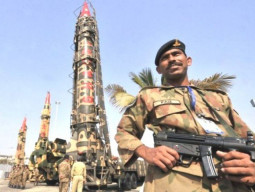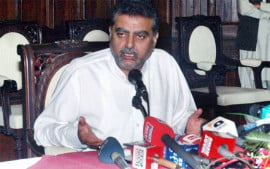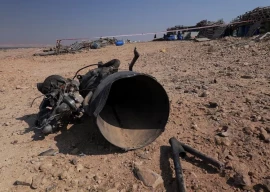
ISLAMABAD:
Experts and scholars discussed issues related to peaceful use of nuclear technology and non-proliferation regime. They stressed the international community to understand the energy needs and security compulsions of Pakistan.
A three-day seminar-cum-workshop was organised by the Strategic Vision Institute (SVI) from the 24th to the 26th of June. The workshop and seminar was aimed at analysing the current issues in the field of peaceful uses of nuclear technology, non-proliferation as well as nuclear safety and security, for mid-career civil and military officers, young academics and journalists.
Dr Shahid Bukhari from Islamia University Bahawalpur stressed that the international community needed to understand the growing energy crises, economic challenges, regional political developments as well as the security compulsions of Pakistan. He stated that nuclear technology provided for civilian purposes should, and did not, need to be misused.
Rizwan Sharif, a lecturer at Fatima Jinnah Women University (FJWU) elaborated on the role of nuclear technology in electric power generation, agriculture and health sector. He said, “Nuclear technology is closely connected to our lives.” Sharif said, “The scope of peaceful use of nuclear technology can be widened to serve us in a better way, provided we make the necessary safety and security measures.”
Air Commodore Ghulam Mujahid discussed the prospects of nuclear power generation in Pakistan, and the drawbacks attached to it.
Pakistan Atomic Energy Commission (PAEC) Applied Systems Analysis Division Director Ghulam Rasool Athar, while presenting on “nuclear power generation and Pakistan’s energy crisis” discussed options for power generation.
Dr Zafar Khan said that a nuclear non-proliferation regime without the effective role of major powers was like the “emperor with no clothes.”
Air Commodore Dr Adil Sultan, emphasised that the membership of the Nuclear Supplier’s Group (NSG) should be criteria-based as it would help universalise the regime application.
Ambassador Tariq Osman Hyder stressed that nuclear CBMs were organically linked to conventional CBMs, and part of civil and military CBMs between the two countries. On the NSG, the ambassador stressed that Pakistan’s case for membership based on a criteria-based approach, not an approach resting on political consideration of exceptionalism, was stronger than that of India.
He said that the US-India nuclear deal had driven a stagecoach through the non-proliferation regime leaving eight Indian power reactors and its ambitious breeder reactors programme outside safeguard, capable of producing a vast quantity of nuclear weapons annually. On the other hand, the ambassador said all of Pakistan’s power generation reactors were under International Atomic Energy Agency (IAEA) safeguards and the government policy was to keep future such civil reactors under safeguards too.
Air Commodore Khalid Iqbal explained that Pakistan was managing its nuclear assets in a way that decreased the risk of nuclear terrorism in the country.
Published in The Express Tribune, June 28th, 2014.
COMMENTS (1)
Comments are moderated and generally will be posted if they are on-topic and not abusive.
For more information, please see our Comments FAQ





















1713246307-0/OIP-(2)1713246307-0-270x192.webp)
_updates1713245447-0/1178596_7858743_Salman-Khan-(2)_updates1713245447-0-270x192.webp)






















One cannot resist the laughter in hearing about this. Does anyone in their right mind think that NSG will be extended to PAK in this current environment.
India started her three tier program in 1950s. PAK had an opportunity in the gifted Karachi plant. instead she built AQKhan network.
Dismantle the nuclear weapons and use the enriched uranium for your power plants will be the answer.
For another twenty to thirty years no US politician will entertain this request.